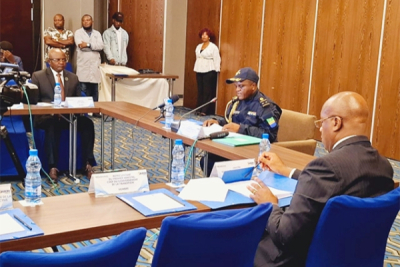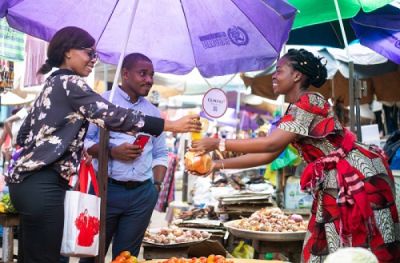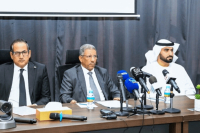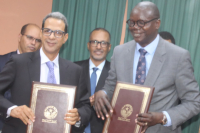He is an experienced graphic designer, art director, and cultural promoter with a proven track record of transforming ideas into innovative and impactful creations.
Fiacre Dagbegnon (photo) is a Togolese entrepreneur committed to driving the digital transformation of businesses and products in Africa. He is the founder and promoter of Klumer, a platform dedicated to players in the event industry.
Launched in 2018, Klumer is an event management solution that provides innovative tools to streamline the work of African event professionals. The platform simplifies fundraising, logistical coordination, and financial management, making it easier to plan and execute successful events. Key features include online voting, crowdfunding, stakeholder networking, and electronic ticketing, fostering greater interaction with target audiences.
"Klumer was developed following the style of Facebook and Instagram. Today, we have nothing to envy when it comes to what Silicon Valley developers have achieved in social network development. The only difference lies in the logistics, which we have yet to fully match," Fiacre explains. The platform has already attracted more than 200,000 users and participants, along with over 250 virtual agencies.
Since 2015, Fiacre Dagbegnon has served as the CEO of EODS C Group, a company specializing in technology and cultural affairs. During his time there, he has also worked as a graphic designer.
Between 2017 and 2020, Dagbegnon worked as a freelance graphic designer. In 2019, he joined La Voix du Peuple, a Togolese weekly publication, as a production graphic designer. From 2020 to 2023, he served as a web interface designer at the French Institute of Togo.
By Melchior Koba,
Editing by Sèna D. B. de Sodji
Following the disruption caused by the COVID-19 pandemic, tourism in Africa is experiencing a strong resurgence. Travelers are now seeking high-quality lodging options, and tech-savvy entrepreneurs have emerged with innovative solutions to effectively meet this growing demand.
Conservio is a South African online booking platform specializing in nature-based stays across Southern Africa. Founded in 2020 by Lara Dendy Young and Justin Rijnberg in Cape Town, it “helps nature lovers discover and book unique getaways in locations that celebrate nature.”
On January 16th, 2025, it announced the completion of a $1 million funding round to grow its portfolio to over 2,000 properties and attract more travelers.
To book a stay, users create an account on the Conservio website. They can then use the search function to input their desired travel dates, number of guests, destination country (South Africa, Mozambique, or Namibia), and specific region. Conservio's algorithm then presents a curated list of matching properties, including cabins, cottages, camps, lodges, and villas.
Travelers can easily compare options based on their preferences, budget, and availability. Once a suitable accommodation is selected, the booking process is seamless, with secure online payment options available. "Demand for independent travel within Africa is experiencing rapid growth," explains Justin Rijnberg, co-founder of Conservio. "We're witnessing a surge in tech-savvy travelers seeking unique stays beyond city limits. These travelers value the convenience of booking and paying online, seamlessly and in one place."
By Adoni Conrad Quenum,
Editing by Feriol Bewa
On the cusp of a major digital transformation, Gabon is leveraging innovative technological solutions to modernize its public services. The goal is to position itself as a regional leader in e-governance, streamline access to administrative procedures, and enhance transparency.
Gabon is set to launch a digital public services platform in the first half of 2025. This initiative was announced, on January 15, in Libreville, during the second meeting of the Steering Committee in charge of the implementation of Gabon’s digital program Gabon Digital. The goal is to modernize the administration and provide all citizens with online access to administrative services.
"We will focus on digital payment systems, the national digital identity system, and implementing a public services platform," explained General Bonjean Rodrigue Mbanza, Minister of Digital Economy and New Information Technologies. "Our objective is to enable anyone, anywhere in the world, to connect with public services in real-time."
This platform is part of the program "Gabon Digital", which was launched last November with initial funding of 44 billion CFA francs (approximately $72.4 million) from the World Bank. This initiative reflects Gabon's ambition to solidify its leadership in e-governance in Africa. Although Gabon dropped from 11th to 15th place in the United Nations' E-Government Survey 2024, it remains a leader in Central Africa for digital initiatives.
The upcoming portal will allow Gabonese citizens to securely perform administrative tasks online, streamlining data processing and reducing the need for in-person visits. Key areas of focus include health (e-health), digital payments, and digital identity. The project aims to modernize public services while enhancing their efficiency and transparency.
By Samira Njoya
Editing by Sèna D. B. de Sodji
Frustrated by negative online shopping experiences, this tech entrepreneur decided to create an e-commerce platform that solves these issues.
Ajé is a Nigerian social commerce platform powered by blockchain technology. It was launched in 2022 by Ifeoluwa Wole-Osho to address the lack of trust in online transactions. The startup is headquartered in Lagos.
“I remember a friend who paid for a laptop only to discover it didn’t work, with no recourse to recover their money. These problems weren’t limited to students – small businesses and everyday people across Nigeria faced similar struggles when trading online. The trust gap in these transactions wasn’t just a nuisance; it was a barrier to economic opportunity,” Ifeoluwa Wole-Osho told Disrupt Africa.
Ajé offers a mobile application available on iOS and Android, with over 5,000 downloads according to Play Store data. Users create an account with their personal information and gain access to a secure marketplace where buyers and sellers can connect seamlessly, supported by escrow payments, dispute resolution tools, and multi-currency wallets.
Since its 2022 launch, the platform has gained over 7,500 users and facilitated more than 4,000 secure transactions. It is experiencing rapid growth, with a 50% increase in monthly registrations and a 32% rise in repeat transactions.
“Product listings continue to grow, with over 17,000 total listings, 1,700 of which were added in the last month alone. These metrics demonstrate the platform’s expanding ecosystem and its ability to meet the needs of both buyers and sellers effectively,” added Ifeoluwa Wole-Osho.
Ajé sets itself apart from competitors by combining social commerce, blockchain-based escrow services, and cross-border support, catering to underserved markets. The platform aims to expand its operations and enhance its product offerings to continue meeting the needs of buyers and sellers effectively.
“By Q3 2025, we aim to target the diaspora communities in the UK and Canada, leveraging insights gained from our success in Turkey to serve these broader audiences effectively,” Wole-Osho concluded.
By Adoni Conrad Quenum
Editing by Feriol Bewa
He is a computer engineer with several years of experience in developing technological solutions and managing IT projects. He stands out for his innovative mindset, particularly in areas such as healthcare.
Hachi Bilal (photo) is an Algerian tech entrepreneur and computer scientist. He is the founder of eSiha, a multi-service digital medical platform aimed at becoming a vital healthcare partner for Algerians.
Founded in 2019, eSiha offers a mobile application that allows users to access various healthcare services. It enables the search and geolocation of doctors and provides healthcare professionals with tools to manage their practices and medical centers, conduct teleconsultations, and create online medical records.
The app lists doctors, dentists, midwives, medical centers, laboratories, radiology centers, and pharmacies. It also facilitates searches for optical centers, ambulance services, home care, and online appointment scheduling. To date, the platform boasts 10,850 registered practitioners, 77,000 users, and records 4,000 daily connections.
eSiha is developed by hachITech, an IT services and technology company founded by Hachi Bilal in 2016 and based in France. The company supports clients through audits and consulting missions to optimize their information systems, designs and integrates IT solutions, and provides tailored technical assistance.
Additionally, Hachi Bilal is the co-founder and application development lead at GroupBees, a community of IT professionals dedicated to expertise, knowledge sharing, and professional skills.
Hachi Bilal graduated from the National Polytechnic Institute of Toulouse in 2011 with a master’s degree in automated computing. That same year, he completed a four-month program in programming and IT project management at the Higher Institute specializing in IT professions (ISSMI) in France. Between 2009 and 2012, he also pursued a doctorate at the Faculty of Natural and Life Sciences at Oran 1 Ahmed Ben Bella University in Algeria.
Hachi Bilal served as a substitute professor at the University of Grenoble Alpes from 2011 to 2013. In 2013, he joined Safran, a company specializing in aerospace and space technologies, as a full-stack engineer. In 2015, he became a technical manager at Air France before moving to Enedis in 2016 as a full-stack engineer. In 2017, he was appointed technical manager at the Les Mousquetaires Group, a European retail company. Finally, between 2021 and 2022, he worked as a cloud architect at Artcurial, a French auction house.
By Melchior Koba
Editing by Sèna D. B. de Sodji
Financial inclusion in Africa still has a long way to go. In recent years, fintech startups have been offering solutions that are better suited to the daily lives of the continent's populations.
CLIKPAY Money is a neobank established by a Gabonese startup, offering mobile payment and money transfer services to both individuals and businesses. Founded in 2020 by Mark Doumba, the startup operates from headquarters in Libreville, Gabon, and Dubai, United Arab Emirates.
The CLIKPAY solution includes a mobile app available on both iOS and Android platforms, with over 10,000 downloads according to Play Store’s data. Users can create an account by providing personal information, which grants access to various CLIKPAY features.
Key features of the app include real-time fund transfers with alerts, QR code scanning for merchant payments, purchasing airtime and internet bundles from multiple telecom operators, and access to a network of agent points across Gabon's nine provinces for convenient cash deposits and withdrawals.
For businesses, CLIKPAY offers the CLIKPAY Business service. This allows companies to manage payroll, pay suppliers, generate transaction reports, evaluate performance, handle invoicing, and perform accounting tasks via the mobile or web application.
According to CLIKPAY, every transaction is encrypted and protected by a personal code (Mpin), with robust fraud detection systems in place to safeguard user security.
By Adoni Conrad Quenum,
Editing by Feriol Bewa
The traditional postal service model has become obsolete with the rapid digital transformation in recent years. To remain competitive and adapt to this new landscape, Mali's postal service has embarked on a transformation and revitalization strategy.
Mali's postal service operator, La Poste du Mali, plans to launch "Post Wari," a digital financial services platform designed to diversify its operations. This initiative is part of the projects outlined by the Ministry of Communication, Digital Economy, and Administrative Modernization in Government News Bulletin No. 249, published on January 10th. The bulletin reviewed the accomplishments of 2024 and detailed the prospects for 2025.
The "Post Wari" platform will facilitate the issuance and management of electronic money, accessible via mobile (app and SMS) and web platforms (tablets and computers). The ministry stated that this platform is expected to become a one-stop payment gateway for government services in the medium term.
Through this initiative, La Poste du Mali aims to capitalize on the opportunities presented by digital technology amidst the growing adoption of mobile money services. According to the Malian Telecommunications, ICT, and Postal Regulatory Authority (AMRTP), the number of mobile money accounts in the country surged from 6.2 million in 2018 to 16.9 million in 2023—a 172.6% increase. The regulator also highlighted that financial inclusion leaped from 47% in 2016 to 72.3% in 2023, largely driven by mobile technology, which now accounts for 55.9% of financial inclusion efforts.
While "Post Wari" has been announced as part of the 2025 outlook, no further details have been provided regarding its launch date or the current stage of development. Furthermore, La Poste du Mali will face stiff competition in a market dominated by telecom operators like Orange. By the end of 2023, Orange Money had 13.1 million subscribers, commanding a 78% market share, according to official statistics.
By Isaac K. Kassouwi
Editing by Sèna D. B. de Sodji
The African cloud market is growing into a multi-billion-dollar industry, fueled by rising digital adoption across the continent. While challenges like limited data centers, regulatory issues, and affordability persist, efforts like localized solutions and AWS’s local currency payment options are making cloud services more accessible to African businesses.
Cloud service provider Amazon Web Services (AWS) has expanded its local currency payment options, now allowing customers in Europe to pay in Egyptian Pound (EGP) and Nigerian Naira (NGN), alongside other newly supported currencies. This move, announced on January 13, is part of AWS’s commitment to localizing the payment experience and making its services more accessible to businesses across Africa.
“Local currencies are important in localizing the payment experience for customers. With payments in their local currencies, customers can avoid foreign exchange costs associated with making foreign currency payments,” says AWS.
Paying in local currencies offers significant benefits for AWS customers. It eliminates the costs associated with currency conversion, which can add substantial overhead to businesses making payments in foreign currencies. Additionally, it reduces payment friction, particularly in countries where local regulations may restrict foreign currency access.
By accepting payments in EGP and NGN, AWS is helping African businesses streamline their billing processes and allocate resources more efficiently, enabling them to focus on growth and innovation.
AWS customers can easily switch to local currency payments by logging into their AWS account, navigating to the “Billing and Cost Management” page, selecting “Payment Preferences” under “Preferences and Settings,” clicking “Edit” to change the default payment currency, and choosing the preferred currency from the dropdown menu. Once saved, all future invoices will be generated in the selected currency.
The Rise of the African Cloud 2023 report by Xalam Analytics reveals that Africa's cloud market has become a multi-billion-dollar opportunity, with annual growth rates of 25% to 30%. This rapid expansion is driving the continent's digital transformation, meeting the growing demand for scalable and cost-effective infrastructure to support startups, SMEs, and large enterprises. The trend underscores the critical role of localized solutions, such as offering local currency payment options, in removing adoption barriers and fueling even faster market growth.
With the inclusion of African currencies, AWS continues to demonstrate its dedication to supporting regional markets and addressing the unique needs of its diverse customer base. This update is expected to drive wider adoption of AWS services across Africa, empowering businesses to scale without the barriers of currency exchange challenges.
Hikmatu Bilali
Digital transformation has become a top priority for education systems across the globe. Countries are modernizing their schools to equip younger generations with the skills and knowledge they need to succeed in the digital age.
Mauritania is advancing its education reform efforts by integrating digital technologies into its system. On January 15, the Ministry of Education and System Reform hosted a workshop that brought together key stakeholders to develop a national roadmap for the digital transformation of education.
According to Yahya Boba Taleb, Secretary General of the Ministry of Education, the workshop aimed to create an education advancement plan with clear milestones for modernizing the sector. The resulting initiatives are expected to lay the groundwork for a sustainable and forward-looking reform tailored to address the country's current challenges.
This initiative aligns with Mauritania's ongoing Digital Transformation Strategy and follows the country's recent participation in the FIFA Foundation's Digital Education Program, marking it as the first African nation to join. The program aims to train 10,000 Mauritanian children aged 6 to 12 over three years in coding, robotics, and digital literacy.
Once finalized, the roadmap will focus on integrating technology into the education system in a cohesive and inclusive manner, with a focus on improving access, quality, and equity in education. It will draw on international best practices to ensure a modernized approach that meets 21st-century demands. Particular attention will be given to rural areas, where students often have limited access to modern educational resources.
By Samira Njoya,
Editing by Sèna D. B. de Sodji
In today's rapidly evolving world of information and communication technologies, regional and international partnerships are crucial for driving inclusive growth, fostering innovation, and enhancing the competitiveness of economies on the global stage.
The Federation of Services of Mauritania and Senegal's Organization of ICT Professionals (OPTIC) signed a memorandum of understanding on Monday, January 13, during Senegalese Prime Minister Ousmane Sonko's official visit to Mauritania. The agreement aims to deepen digital cooperation between the two nations and promote sustainable economic integration.
"This agreement seeks to structure and intensify business partnerships and collaboration between our digital ecosystems to accelerate digital transformation in our countries," said Mbagnick Diop, president of the Senegalese Business Movement.
The partnership underscores a shared commitment to developing the digital private sectors in Mauritania and Senegal. It includes several initiatives such as jointly promoting flagship events and activities in the tech sector, organizing forums and B2B meetings between digital enterprises and other industries seeking digitization, and creating a framework to harmonize public-private dialogue on key issues like human capital, funding, and research and development.
The collaboration is expected to speed up digital transformation in both countries while unlocking new economic and social opportunities. As Senegal positions itself as a tech hub with initiatives like the “New Deal Technologique”, Mauritania is stepping up efforts to modernize its digital infrastructure and administration.
This synergy between the two neighboring nations could serve as a model for other West African partnerships, reinforcing the region’s role in Africa’s burgeoning digital economy. The sector’s value is projected to reach $180 billion by 2025, according to a report by Google and the International Finance Corporation (IFC).
By Samira Njoya,
Editing by Sèna D. B. de Sodji
More...
Passionate about developing high-impact technological solutions for Africa, he incorporates artificial intelligence and machine learning into his innovations.
Thapelo Nthite (photo) is a South African engineer and tech entrepreneur. He is one of the co-founders of Botlhale AI, a company developing artificial intelligence (AI) and machine learning solutions to improve lives across Africa.
Founded in 2019, Botlhale AI specializes in natural language processing (NLP) with a focus on African languages. The company’s tools enable businesses to communicate with their customers in familiar and trusted languages. Botlhale AI envisions a future where Africans can use their native languages to access digital services, learn, grow, and interact with the world.
“Through my research and work at Botlhale I want to see people interact with service providers through digital platforms in languages they understand and trust using text and speech,” Nthite explained in 2020.
One of the company’s flagship products is Bua, a suite of NLP tools that simplifies the deployment of conversational AI across various platforms and industries. Botlhale AI also offers Vula, an AI-powered API designed to enhance call center analytics.
Nthite holds a bachelor’s degree in mechatronic engineering from the University of Cape Town, which he earned in 2018. His career began in 2015 at At Lets Meet, a marketing company, where he worked as a mobile developer and web designer. In 2018, he interned at Sasol, a leading chemical and energy company, gaining hands-on experience in engineering.
By Melchior Koba,
Editing by Sèna D. B. de Sodji
Following his studies in economics and finance, he worked with startups in South Africa, guiding them through their growth phases. Now an entrepreneur himself, he's using technology to empower businesses with more efficient workforce management solutions.
Niven Poleman (photo) is a South African economist and tech entrepreneur. He is the founder and CEO of WorkWeek, an innovative startup helping businesses optimize workforce management.
Founded in 2023, WorkWeek offers a digital platform tailored to businesses employing salaried workers. Using data analytics, the platform streamlines payroll management, rewards top-performing employees, and simplifies time tracking, attendance management, and compliance with labor laws—particularly in labor-intensive industries like construction.
WorkWeek’s mission is to simplify workforce management, empower workers, and strengthen employer-employee relationships. “I’ve always believed that people deserve a fair chance to rise above their circumstances. WorkWeek is our way of helping wage-earning workers build great careers and giving businesses the tools to invest in their people,” says Poleman.
A graduate of the University of Cape Town, Poleman earned a bachelor’s degree in management and economics in 2018, followed by a bachelor’s in financial market economic analysis in 2022.
He began his professional journey in 2019 as a digital marketing manager and studio manager at YogaSpirit, a yoga studio. In 2020, he joined WeAreMonsters Innovative Venture Development, focusing on research and UX (user experience) design. From 2021 to 2023, he served as venture manager at The Delta, an entrepreneurial ecosystem supporting founders in creating groundbreaking ventures.
By Melchior Koba
Editing by Sèna D. B. de Sodji
Many African entrepreneurs have struggled to scale their ideas due to inadequate support structures. The launch of Startup Community Catalysts addresses critical challenges faced by startups in the region, including limited access to funding, mentorship, and global networks.
Early-stage startup investor, Techstars, and Merce Anders Equity Group announced the launch of Techstars Startup Community Catalyst Africa Botswana on January 13. The program will run pre-accelerator and startup education programs over the next two years, including the Techstars Founder Catalyst, Community Development Lab, and Startup Weekends. These initiatives aim to help early-stage entrepreneurs refine ideas, scale businesses, and create lasting community impact.
For Emilie Vallauri, Program Manager at Techstars, “This partnership with Merce Anders Equity Group unlocks the potential of entrepreneurs in Botswana and neighboring countries, enabling them to create transformative solutions locally and globally.”
The Techstars Startup Weekend, running March 28–30, 2025, will provide a 54-hour event for entrepreneurs to develop ideas, form teams, and pitch projects, with winners earning spots in the Founder Catalyst program. On July 16, 2025, the Community Development Lab will gather community leaders and innovators in a one-day workshop to foster collaboration and sustainable startup ecosystems. From May 5 to July 20, 2025, the 10-week Founder Catalyst pre-accelerator will prepare up to 20 early-stage startups for funding and scaling. Applications are open until March 16, 2025.
This initiative has the potential to generate employment and boost local economies, particularly in Botswana, where unemployment remains a significant issue, recorded at 27.6% in Q1 2024, according to the World Bank.
By partnering with Merce Anders Equity Group, Techstars brings global expertise to the region, enabling startups to tap into international networks. This is vital in a globalized market, where competitiveness often hinges on access to resources and markets beyond local boundaries.
The move aligns with the Botswana government’s proactiveness in fostering entrepreneurship through agencies like the Botswana Innovation Hub (BIH) and Local Enterprise Authority (LEA) which provide funding, incubation, and training for startups.
Hikmatu Bilali
Many small and medium-sized businesses (SMBs) in Africa face difficulty obtaining funding from traditional banks. To overcome this obstacle, a group of tech entrepreneurs in Morocco has created an innovative solution.
Talaty, a Moroccan fintech start-up founded in 2022 by Soulaimane Lahrech, Simo Bernoussi, Ilyas Oudghiri, and Zakaria E., is leveraging artificial intelligence (AI) to address the financial challenges faced by small and medium-sized enterprises (SMEs). By analyzing SME data, the company determines creditworthiness even for businesses with limited financial records.
Through advanced AI technologies and behavioral finance analytics, Talaty aims to optimize credit assessments, cutting operational costs and default rates by up to 90%. This innovative approach seeks to improve SMEs' access to financing while equipping financial institutions with effective tools for risk management and operational efficiency.
In December 2024, Talaty secured undisclosed funding to bolster its presence in Morocco and explore expansion into neighboring markets. "Securing financing remains a major obstacle for SMEs, accounting for 40% of bankruptcies caused by payment defaults. Our AI-powered platform simplifies this process, enabling partner institutions to provide effective and rapid financial support," said Soulaimane Lahrech.
Despite their critical role in the African economy, SMEs continue to face significant hurdles in obtaining the funding required for growth. According to Didier Acouetey of AfricSearch, a South African HR consulting firm, as reported by Forbes Afrique, "Africa has over 100 million SMEs needing $350 billion annually for development, yet they secure barely 20% of this amount."
By Adoni Conrad Quenum,
Editing by Feriol Bewa















